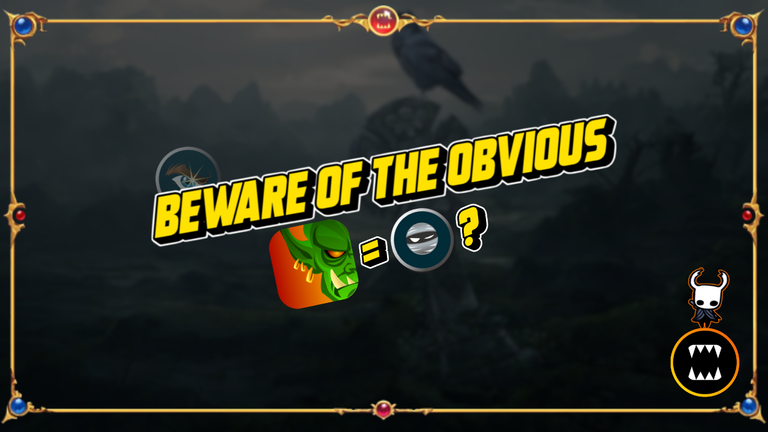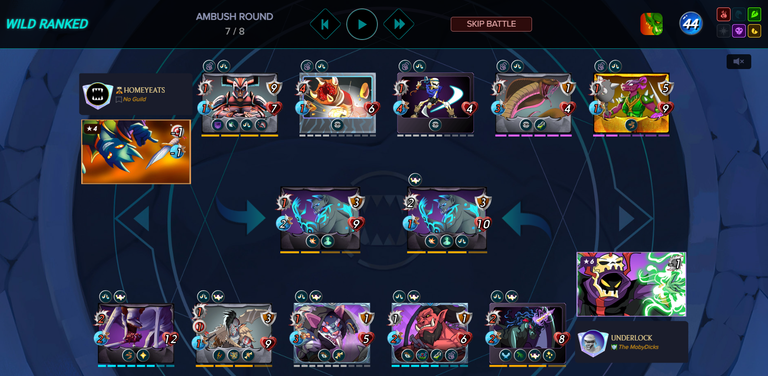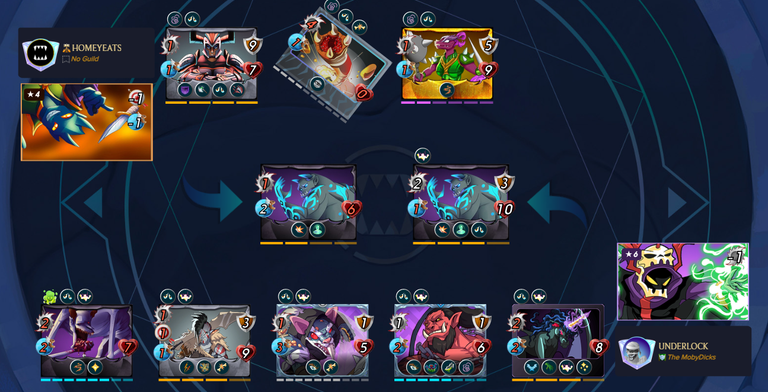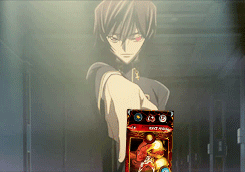
Translated by ChatGPT.
Some Rule Sets in Splinterlands are highly restrictive and heavily guide the types of compositions that can be used. I discussed this topic in more depth in this post and would like to add that in such situations, the obvious strategy works IF you have a robust collection with cards at the appropriate level for it.
If that’s not the case for you, it’s extremely important to analyze the situation and avoid the obvious so your team isn’t devastated by an opponent with superior cards. Let’s use my match with the Rule Set Up Close and PersonalReachSneakThorns  as an example. With this rule in play, many players tend to pick a card with
as an example. With this rule in play, many players tend to pick a card with  , others with
, others with  , and a tank-focused card in the last position to defend against these attackers. This card will usually have good defensive stats and the
, and a tank-focused card in the last position to defend against these attackers. This card will usually have good defensive stats and the  ability.
ability.

Notice that’s exactly what my opponent did, only replacing the ReachDemoralizeDemoralizeSneak  with a card with
with a card with  , which is extremely useful. My composition took a similar approach in the backline, but I reinforced the debuff with the summoner and another
, which is extremely useful. My composition took a similar approach in the backline, but I reinforced the debuff with the summoner and another  . Additionally, none of my offensive cards used
. Additionally, none of my offensive cards used  to avoid reflected damage.
to avoid reflected damage.
Instead, I opted for OpportunityCursed Windeku, and one by one, all cards with Sneak  to target the weakest link in the enemy team and included a card with two attack types to mitigate the impact of debuffs. However, in this case, the opponent’s unconventional summoner choice proved quite effective. Even so, their attackers lacked the strength to take down the
to target the weakest link in the enemy team and included a card with two attack types to mitigate the impact of debuffs. However, in this case, the opponent’s unconventional summoner choice proved quite effective. Even so, their attackers lacked the strength to take down the  were eliminated.
were eliminated.

After defeating the main source of damage in the opposing team, there was nothing left for them to do but watch as their remaining cards were taken down one by one. I made sure to distribute my damage across multiple sources (MeleeRangedPoisonCripple  ,
,  ,
,  ,
,  ) to handle various scenarios and avoid being trapped in a situation I couldn’t overcome.
) to handle various scenarios and avoid being trapped in a situation I couldn’t overcome.
That’s why I recommend always using this second line of thinking and reflecting on whether your strategy is too obvious. If it is, check whether you have a strong enough collection to take that path. If the answer is no, then you might want to explore alternative approaches to outsmart the obvious and surprise your opponent. After all, Splinterlands is a purely strategic and predictive game.
Thank you so much to everyone who read this far, I hope you enjoyed it. If you like my content, I ask you to send your vote on the post and follow my profile so you can read future posts.




Algumas Rule Sets do Splinterlands são muito restritivas e direcionam bastante os tipos de composições que podem ser utilizadas. Eu abordei esse tema com mais profundidade nesse post e quero complementar que nessas situações, a estratégia óbvia funciona SE você possuir uma coleção robusta com cartas no level adequado para tal.
Se não for o seu caso, é extremamente importante que você analise a situação e evite o óbvio para que seu time não seja devastado por um oponente que possua cartas superiores. Vamos utilizar como exemplo a minha partida que veio com a Rule Set Up Close and PersonalReachSneakThorns  . Com essa regra em jogo, muitos jogadores tenderão a escolher uma carta com
. Com essa regra em jogo, muitos jogadores tenderão a escolher uma carta com  , outras com
, outras com  e uma carta focada em tankar na última posição justamente para se defender esses atacantes. Essa carta normalmente terá boas estatísticas defensivas e também a habilidade
e uma carta focada em tankar na última posição justamente para se defender esses atacantes. Essa carta normalmente terá boas estatísticas defensivas e também a habilidade  .
.

Perceba que foi isso que meu oponente fez, substituindo apenas o ReachDemoralizeDemoralizeSneak  por uma carta com
por uma carta com  que é extremamente útil. Já a minha composição tomou uma estratégia semelhante na backline, porém reforcei o debuff com o invocador e um
que é extremamente útil. Já a minha composição tomou uma estratégia semelhante na backline, porém reforcei o debuff com o invocador e um  , além de todas as outras cartas ofensivas não utilizarem o
, além de todas as outras cartas ofensivas não utilizarem o  justamente para evitar tomar dano refletido.
justamente para evitar tomar dano refletido.
Em vez disso, optei pelo OpportunityCursed Windeku e aos poucos todas as cartas com Sneak  para focar no elo fraco do time adversário e por uma carta com dois tipos de ataque para evitar sofrer tanto com debuffs, mas nesse caso a escolha inusitada de invocador do oponente acabou sendo bastante efetivo. Mesmo assim os seus atacantes não tiveram força suficiente para derrubar o
para focar no elo fraco do time adversário e por uma carta com dois tipos de ataque para evitar sofrer tanto com debuffs, mas nesse caso a escolha inusitada de invocador do oponente acabou sendo bastante efetivo. Mesmo assim os seus atacantes não tiveram força suficiente para derrubar o  foram sendo eliminadas.
foram sendo eliminadas.

Depois de derrotar a principal fonte de dano do time adversário, não havia mais nada que ele pudesse fazer além de ver suas demais cartas serem derrubadas uma a uma. Eu tive o cuidado de distribuir meu dano em diferentes fontes (MeleeRangedPoisonCripple  ,
,  ,
,  ,
,  ) para conseguir lidar com diversas possibilidades e não ficar preso em uma situação que fosse incapaz de superar.
) para conseguir lidar com diversas possibilidades e não ficar preso em uma situação que fosse incapaz de superar.
Por isso eu recomendo que você sempre utilize essa segunda linha de pensamento e reflita se sua estratégia está muito óbvia, se estiver, verifique se você possui uma coleção forte o suficiente para tomar esse caminho. Caso a resposta seja não, então talvez você deva buscar outras linhas de raciocínio para driblar o óbvio e surpreender seu oponente, afinal Splinterlands é um jogo puramente estratégico e de previsão.
Muito obrigado a todos que leram até aqui, espero que tenham gostado. Se vocês curtirem meus conteúdos, peço que deixem o seu voto na postagem e sigam o meu perfil para poderem acompanhar as futuras postagens.


Posted Using InLeo Alpha
Delegate Tokens and HP to Fallen Angels to earn weekly rewards!
Delegate | Join to the guildThis post has been supported by @fallen.angels guild!
Delegate your HP to the hive-br.voter account and earn Hive daily!
🔹 Follow our Curation Trail and don't miss voting! 🔹
Your post was manually curated by @shiftrox.Good strategy. I think the opponent target the card (snipe ability) with thorn which unfortunately for them was the windeku with a heal ability